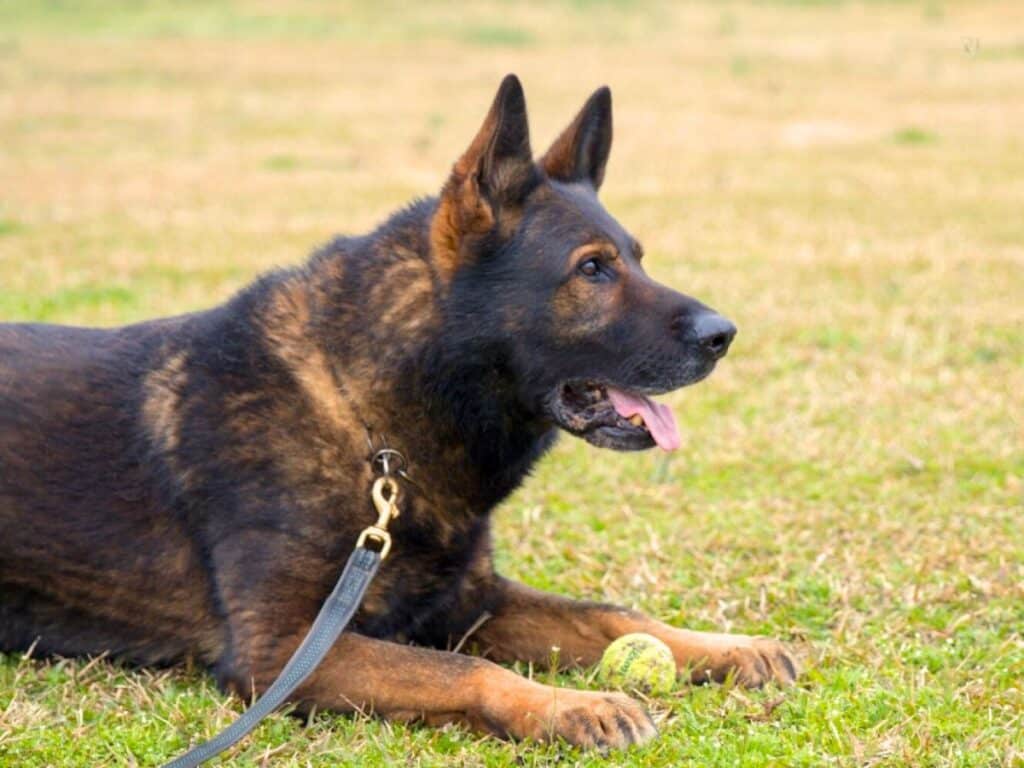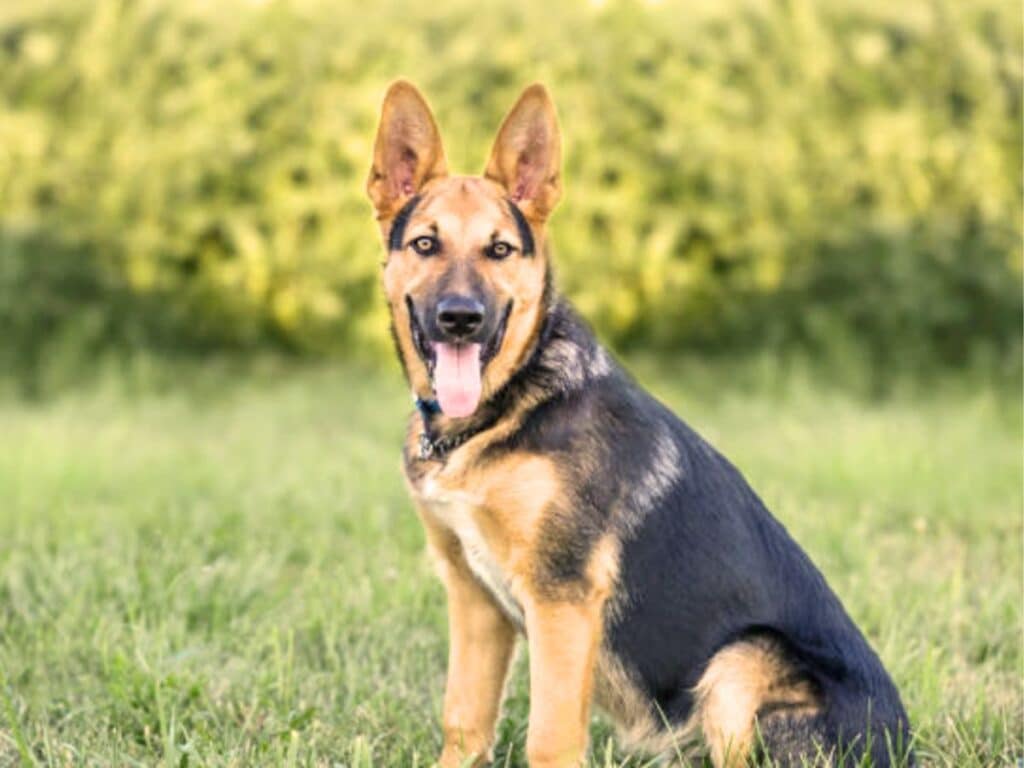Congratulations on your 1-month-old German Shepherd! These young pups are not only adorable but also incredibly quick learners.
In this article, I’ll share valuable tips, and must-know facts that will make your journey with your 4-week-old German Shepherd puppy even more enjoyable!
From their size & weight to their diet and general care, we will cover all the essential topics to help you raise a happy, healthy, and well-behaved dog.
1 Month Old German Shepherd Puppy
The table below provides a snapshot of various aspects of a one-month-old German Shepherd’s development, including crucial details about their feeding routine, behavior, weight, size, and more.
| Feeding | 4-5 meals a day, primarily mother’s milk or a specially formulated puppy milk replacer. Introduce soft puppy food/mush around 3-4 weeks. |
| Weight | Typically around 4.5-9 pounds |
| Size | Small, approximately 3-6 inches at the shoulder |
| Behavior | Limited mobility, mostly sleeps and eats. Begins to explore surroundings with wobbly movements. Developing basic socialization skills through interactions with littermates and mother. |
| Health | Generally healthy, but susceptible to infections. Regular veterinary check-ups are essential. |
| Vaccinations | Vaccination for a GSD pup should begin when they are 6-8 weeks old. |
| Sleeping Habits | Sleeps for the majority of the day, about 18-20 hours. |
| Training | Very basic, mostly learning from the mother and littermates. Begin introducing gentle handling and positive associations. |
| Socialization | Developing social bonds with littermates and mother. Limited interaction with humans. |
| Toileting | At this age, puppies need their mother’s stimulation or something similar to urinate and defecate. |
| Growth Milestones | Eyes and ears fully open. Beginning to stand and walk, although still unsteady. |
Remember that these details are general guidelines, and individual puppies may vary. Regular veterinary care and attention to the specific needs of the puppy are crucial during this early stage of life.

1 Month Old German Shepherd Size & Weight
At 1 month old, a German Shepherd puppy typically weighs between 4.5 to 9 pounds and stands at around 3 to 6 inches tall at the shoulder.
At this age, their proportions are adorable and reflect the initial phase of growth. As they progress through their puppyhood, German Shepherds will undergo significant size and weight changes, reaching their full-grown stature in the subsequent months and years.
It’s important to provide them with appropriate nutrition and care during this crucial stage to support healthy development.
To learn more about the growth & development of your puppy you can refer to my article: German Shepherd Growth & Weight Chart
Feeding Your Puppy
Feeding a 4-week-old German Shepherd puppy requires careful attention to their nutritional needs for healthy growth and development.

What to feed a 1 month old German Shepherd puppy?
At this age, the primary source of nutrition is usually the mother’s milk. If, for some reason, the mother is not available or unable to nurse, you can consider using a specially formulated puppy milk replacer. Here’s a general guideline for feeding a one-month-old German Shepherd puppy:
- Mother’s Milk or Puppy Milk Replacer:
- Aim for 4-5 small meals per day.
- If the mother is present, allow the puppy to nurse as much as needed. The mother’s milk provides essential nutrients and antibodies for a strong immune system.
- Introduction of Soft Puppy Food:
- Around the third to fourth week, you can introduce a high-quality, veterinarian-recommended soft puppy food.
- Initially, make gruel by mixing a milk replacer in puppy food soaked in water and place this mixture in a flat saucer.
- The puppies’ noses should be carefully dipped into the mixture two or three times per day until they begin to lap; this usually takes one to three days.
- The weaning process begins when you introduce soft puppy food. Gradually decrease the amount of milk and increase the amount of solid food.
- The amount of moisture should be decreased daily until they are eating dry food with little or no moisture added (usually by four to six weeks of age).
- Monitor and Adjust:
- Pay attention to the puppy’s reaction to the food. If there are any signs of digestive upset, consult with a veterinarian to adjust the diet accordingly.
- Gradually increase the amount of puppy food as the puppy grows and their nutritional needs change.
Ensure that the puppy has access to clean, fresh water at all times, especially if you are introducing soft puppy food.
Avoid feeding table scraps or human food to your pup as it can cause digestive problems such as diarrhea or vomiting.
It’s crucial to consult with a veterinarian for specific feeding recommendations tailored to your puppy’s health, size, and individual needs.
RELATED: German Shepherd Feeding Chart By Age

How To Take Care of a 1 Month Old German Shepherd?
Taking care of a 1-month-old German Shepherd requires special attention and care. Here are some tips to ensure the well-being of your puppy:
1. Provide appropriate food to your pup
If the puppy is not with its mother, you’ll need to feed it a specialized puppy formula. (Source)
Consult with your veterinarian to choose an appropriate brand and follow the recommended feeding guidelines.
Puppies of this age usually need to be fed every 2-4 hours. You may need to wake up during the night for feedings.
Use a small, soft bottle with a nipple suitable for puppies. Ensure the formula is at a warm, not hot, temperature.
Introduce soft puppy food around the third to fourth week, gradually transitioning from liquid to solid food.
Ensure access to clean, fresh water at all times, especially when introducing solid food.
RELATED: How Much Water Do German Shepherds Drink in a Day?
2. Sleep requirements of your puppy
At one month old, German Shepherds need around 18 – 20 hours of sleep each day.
According to the American Kennel Club, Puppies at this age tend to sleep in short intervals, often waking up to feed or relieve themselves.
They may be awake for only an hour or two before going back to sleep.
It’s important not to disturb your puppy’s sleeping schedule as it can affect their growth and development.
Make sure they have a comfortable and quiet sleeping area where they can rest without any disturbance.
RELATED: How Many Hours Do German Shepherd Puppies Sleep?
3. Regular health check-ups
Schedule regular veterinary check-ups to monitor the puppy’s overall health, receive vaccinations, and address any concerns.
Discuss with your veterinarian about parasite prevention, including deworming and flea control.

4. Start early socialization
3-12 weeks is the socialization age for a puppy, so a 4-week-old puppy should be encouraged to have positive interactions with littermates, other dogs (if safe), and gentle human handling.
Expose the puppy to various sights, sounds, and environments in a controlled and safe manner.
RELATED: How To Socialize a German Shepherd Puppy
5. Help your puppy in relieving themselves
Puppies need help with elimination at this age.
Gently stimulate their genitals and anus with a warm, damp cloth after each feeding to simulate the mother’s licking and encourage elimination.
Begin the process of house training by introducing a designated potty area.
6. Exercising your 1 month old GSD puppy
While it’s important not to over-exercise your 1-month-old German Shepherd puppy, it’s also essential that they get enough physical activity to promote healthy growth.
Gradually introducing short walks or playtime outside the house can help with their physical development.
Start by taking them out for just a few minutes at a time, gradually increasing the length of time as they become more comfortable and confident.
RELATED: German Shepherd Puppy Exercise Chart By Age
7. Provide simple basic obedience training
At 4 weeks old, your German Shepherd is still developing physically and mentally.
Introduce simple training exercises such as sit, stay, and come to establish good behavior habits early on.
Use positive reinforcement techniques such as treats or praise to encourage good behavior.
8. Provide mental stimulation to your puppy
While physical activity is essential, mental stimulation can prevent boredom and stress in your puppy.
Interactive games provide both physical and mental activity for your puppy.
Hide-and-seek is a fun game that can stimulate their senses while also teaching them recall skills.
Start by hiding behind a piece of furniture or calling out their name from another room. When they find you, reward them with praise or a treat.
Make sure that you do not over-exert them with too much activity or training.
9. Introduce your puppy to crate training
Crate training is an effective way to provide your 1-month-old German Shepherd puppy with a safe and comfortable space.
The crate should be large enough for your puppy to stand up, turn around, and lie down comfortably, but not so large that they can use one end as a bathroom.
Add a soft blanket or dog bed & toys to the crate to make it a comfortable and cozy space for your doggy.
10. Provide emotional support
Spend quality time bonding with your puppy to build a strong emotional connection.
Provide toys for mental stimulation and to help soothe teething discomfort.

Check out this video of cute 1 month old black German Shepherds playing…
Potty Training Your 1 Month Old GSD
Establish a consistent potty schedule
Although puppies at this age need to be stimulated to relieve themselves, setting up a potty training schedule is crucial.
Take your puppy outside to their designated potty area every 30-60 minutes, especially after they wake up, eat, or play. This regular routine helps them understand where and when they should go potty.
Remember that puppies have small bladders and may not be able to hold it for long periods.
Use positive reinforcement
When your 1-month-old German Shepherd successfully goes potty in the right place, shower them with praise and rewards. Positive reinforcement such as treats or verbal praise creates a positive association with proper potty behavior.
Clean up accidents properly
Accidents are inevitable during potty training, but how you clean them up can impact future behavior.
Use an enzymatic cleaner specifically designed for pet messes to thoroughly eliminate odors from accidents inside your home.
By properly cleaning up accidents, you’re reducing the likelihood of repeat offenses in those areas.

When should GSD puppies receive vaccinations?
The vaccination for puppies should be started at about six to eight weeks of age. This is the age when many maternal antibodies are beginning to die and the puppy becomes susceptible to infectious disease.
Puppies are protected against many canine diseases before and shortly after birth by passive antibody transfer from their mother. These maternal antibodies protect the puppies against the diseases to which the mother is immune during the first few weeks of life.
Although very protective, maternal antibodies last for only a few weeks; after this time, the puppy becomes susceptible to disease.
Closing Thoughts
As you embark on this journey with your new 1-month-old German Shepherd puppy, keep in mind that building a strong bond takes time, so don’t rush the process. Embrace each step of the process, from potty training to socialization, and enjoy the rewarding experience of witnessing your puppy’s development. Stay committed to providing love, guidance, and care, and you’ll surely build an unbreakable bond with your furry companion.
FURTHER READING:




